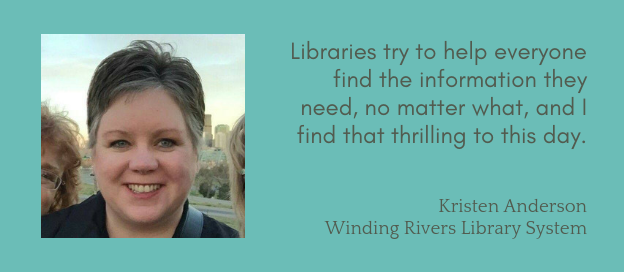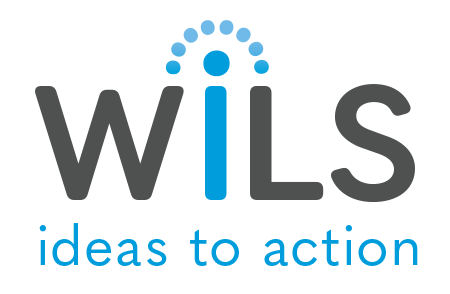
One of our greatest joys at WiLS is hearing our members tell the stories of the big and important work they are doing – interesting new projects or initiatives, or even interesting and new approaches to old projects. And, in addition to hearing about it, it makes us even happier when we can share those stories with other members. Each month, WiLS is proud to feature an interview with one of our library members.
This month, we interview Kristen Anderson, Director of the Winding Rivers Library System.
Why did you, personally, choose to work in libraries?
Probably like many librarians, I remember playing “library” as a child and some of my childhood books probably still have hand-drawn date due slips taped in the back of them. I also remember volunteering in my hometown library to earn a Girl Scout badge, but honestly probably used the badge requirement as an excuse to wield the power of the date due stamp! And yes, the director let me work behind the circulation desk and I loved stamping books and cards.
And although those childhood experiences seem premonitory in hindsight, I went off to college intending to study business and when that lost its appeal, I wasn’t sure what to do next. It wasn’t until I stumbled into the Wisconsin State Historical Society Archives department and the Stephen Sondheim papers (and that’s a story way too long for this interview), that I decided I wanted to be an archivist. When I got to graduate school, I realized that it wasn’t the preservation of materials I was interested in, but the free and open access to them, so I decided to move into public librarianship. I still feel the same awe and deep respect for the role libraries play in providing access to information as I did as a young undergraduate student stumbling into, and being given complete access to, some very remarkable archives. Libraries try to help everyone find the information they need, no matter what, and I find that thrilling to this day.
What is unique about the culture of your library system? How do you influence it?
WRLS is one of several large, rural library systems in Wisconsin. Of our 34 member libraries, four libraries require Grade I certification, two require Grade II certification, and the remaining 28 libraries require Grade III certification, meaning they serve populations less than 3,000. 82% of the libraries we serve are considered small.
What this means for most of our library directors, is that there is no peer in their community, and they need to look to others in the system to serve as a sounding board, listening ear, as well as giving and receiving support and encouragement. Building a strong community to support library directors and staff is an integral part of our mission.
Additionally, when a library system such as ours serves so many small libraries, it means that many new directors come to the job with little or no library experience or education. Most arrive with a passion for the work and a commitment to the library and community, but need to know how to get started. WRLS is able to step in immediately with an in-depth orientation process to help new directors get up to speed before the New Director Bootcamp and certification courses are offered and give them a strong foundation on which to build at those excellent subsequent learning opportunities.
What do you think is important to know about the community you work with? What helps you understand their needs?
It’s valuable to know as much information as possible about the individual communities in the system: their history, culture, community festivals, points of pride, current issues, controversies, challenges, major employers, schools or lack thereof, and everything else. Of course, we cannot customize service to each community but it’s helpful to watch for trends and be aware of unique and/or collaborative opportunities for each community.
What big ideas are being worked on at your library? What problems are being solved?
WRLS has undergone considerable change over the last five years or so. Four years ago we made some significant changes in order to greatly expand our IT department and level of technology support. Then two years ago, we had three longtime employees retire, taking 75 combined years of institutional knowledge with them. With a great deal of member input, we revamped those positions and have emerged an even stronger and reenergized library system. Where will we go next? We’ve just instituted a new plan to improve cataloging record turnaround time for member libraries and it’s been going well. It’s a little ironic that our latest “big thing” is something as old-school and unsexy as cataloging, but strong and responsive cataloging is still a core foundational service our members prioritize highly.
What is the best library career advice you’ve ever received?
A couple of things come to mind. My very first library supervisor, Jim Markiewicz, former director of the special library at the Wisconsin Clearinghouse in Madison, told me that it had served him well financially over the years by not adjusting his lifestyle with every raise and save that money instead. It was hard for me to relate to as a poor graduate student and then entry-level librarian, but I have remembered and appreciated that advice over the years.
The other “voice of experience” wisdom I’ve appreciated came from the former director of OWLS, Rick Krumweide, who once shared a theory that when a library has a director who has been in place for many, many years, it sometimes takes a new director to come in and shake things up, take the blame for changing the status quo and then leave, before the next director can come in and get traction on making long-lasting changes. His theory doesn’t hold true 100% of the time, but I have seen it happen many times since and I always think of Rick when it does.
My advice to a new librarian would be to consider working in a small library where you’ll likely get to work in every area of the library from adult to youth services, building maintenance to budgeting, programming to staffing the circulation desk, and more. You will have the opportunity to work in every area of the library and who knows, you may like it and never leave!
These interviews are part of a series of interviews with both WiLS staff and members. Your feedback is appreciated. If you have any to offer on this article or suggestions for upcoming interviews, contact Andrea Coffin at acoffin@wils.org.
